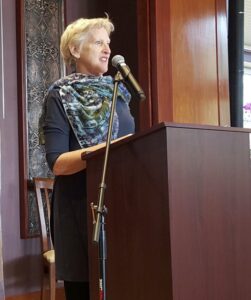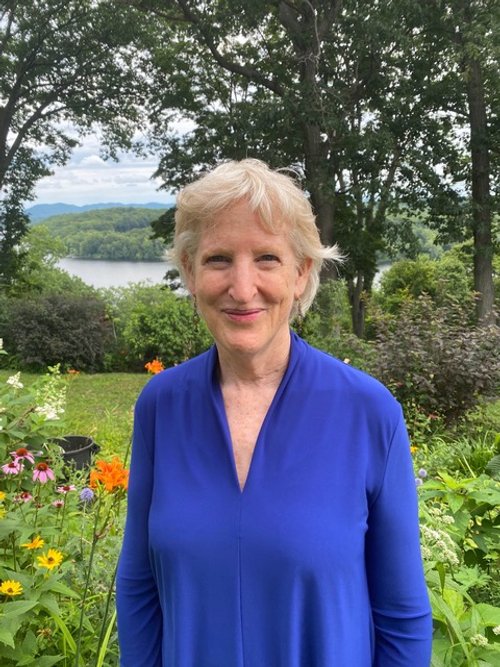From Rabbi Jennie Rosenn
We are deeply saddened by the untimely passing of Rabbi Ellen Bernstein. Ellen was a profound teacher, an inspiring writer, and truly one of the founding mothers of the modern Jewish environmental movement.
Ellen founded Shomrei Adamah – the very first national Jewish environmental organization – and published numerous works that teach exquisitely about the ways in which “nature and the sacred meet.” But beyond these impressive accomplishments, Ellen influenced many of us in deeply personal ways.
Ellen taught us that science alone will not move us to care about the earth. Religion at its best can help us to get in touch with our deepest selves, and inspire us to see the godliness in everything. In the end, we will only save what we love. Ellen, thank you for helping us to recognize our holy, interconnected world and to see with new eyes all that we love.
Ellen wrote that “religious and spiritual communities can be vitally important in organizing, inspiring, and sustaining individuals in the repair of the world.” Ellen truly seeded a movement that seeks to do just this. May we be worthy to carry on your work and may your memory always be a blessing, as it was in life.
From Nati Passow
 On February 29, I was honored to attend the funeral for Rabbi Ellen Bernstein, who had a deeply meaningful influence on my life and the Jewish environmental movement more broadly. I want to share this brief tribute to her life and impact, which we appreciate more and more with each passing day.
On February 29, I was honored to attend the funeral for Rabbi Ellen Bernstein, who had a deeply meaningful influence on my life and the Jewish environmental movement more broadly. I want to share this brief tribute to her life and impact, which we appreciate more and more with each passing day.
I first met Ellen in the late 1990s when I was a student at the University of Pennsylvania, and she came to speak on a panel about Religion and the Environment. I had spent the previous summer leading Jewish teens on wilderness trips and, despite my traditional Jewish upbringing and education, was only beginning to learn about the connections between Judaism and the natural world. After her presentation, I had a chance to speak with her and I picked up a couple of her books – as well as a great bumper sticker from a Christian environmental group that read, “God’s original plan was to hang out in a garden with some naked vegetarians.”
Ellen was the first person I heard speak so poetically about a spiritual connection to the land and the ecological roots of many parts of our Jewish traditions.
She gave me a sense that there was a nascent Jewish environmental movement budding with potential. At a time when I was beginning to explore the works of people like Wendell Berry and Annie Dillard, Ellen introduced me to a Jewish voice with similar sensibilities. Throughout the years that followed, I appreciated her tone, her vision, and presence as one of the founders of this movement that has been my professional, personal, and spiritual home for 25 years.
I used her books in my teaching when I led wilderness trips and taught Hebrew school, and then went to work for the Teva Learning Center in 2002, where her influence was strongly felt. In 2005 I co-founded the Jewish Farm School, which remained in existence until 2019, and Ellen and I would cross paths through that work. I was humbled and honored when, in 2022, she invited me to contribute to her Passover Haggadah, The Promise of the Land, and I am excited to explore her new book, Toward a Holy Ecology, Reading the Song of Songs in the Age of Climate Crisis.
At her funeral last week, it was clear that her impact and influence have been appreciated by many. Rabbi Mordechai Leibling, a close friend of Ellen’s, officiated the service, and spoke beautifully about Ellen’s role in those early years of forming the Jewish environmental movement, the challenges she faced as someone operating outside of the conventional leadership structures of Jewish community, and how she valued the beauty of nature and saw aesthetics as the lure that draws people in to discover deeper meaning and wisdom.
He quoted a teaching of Ellen’s that resonates deeply with the work of Dayenu:
We are moved most powerfully by our emotions. Science alone will not move us to care about the earth. Religion at its best can help us to get in touch with our deepest selves, and inspire us to see the godliness in everything. In the end, we will only save what we love. I believe that the Hebrew Bible can help us see the beauty and aliveness of the earth. The poetry of religious language can speak across political divides and call us to care and to act.
Religious and spiritual communities can be vitally important in organizing, inspiring, and sustaining individuals in the repair of the world. If we could engage religious leaders in care for the earth we could create a powerful infrastructure by which to mobilize masses of people as earth citizens. We could also help to serve the many people suffering from climate grief and anxiety.
Ellen is now resting in one of the green burial sections of the beautiful and historic West Laurel Hill Cemetery outside of Philadelphia, on the top of a steep overlook leading down to the Schuylkill River, with a view that is both wild and distinctly urban.
As we were filling her grave with the soil, Rabbi Simkha Weintraub recited this moving Psalm written for the moment, and shared, “I want You to know, God, that Ellen asserted M’hayei haMeitim (who gives life to the dead) loudly in a Reconstructionist minyan in Philadelphia – affirming that You do, or will, revivify the deceased, And so we request that You acknowledge her traditional and yet rebellious affirmations.”
Shortly after working my first season at Teva 2002, at a point in my life when Ellen’s teachings were part of my daily experience, my grandfather passed away. At his funeral, as we were covering his body with the soil, I noticed the roots from a nearby oak tree reaching into the grave. And in that moment I had a completely new understanding of that blessing: it was not a messianic vision, it was an honoring of the natural cycles. My grandfather’s body was going to become that tree – it was not a metaphor.
And so, as we were placing Ellen’s body into this natural resting place that will eventually become a wild space, it felt so appropriate to learn that she too had this ecological interpretation of the blessing, and most likely had subtly helped me arrive at a similar place. Her wisdom made its way into the movement so seamlessly and gracefully, and in ways we are still coming to fully understand.
Ellen – we owe you such deep gratitude for your offerings and your presence. Your memory is already such a blessing.
We invite you to explore the life and legacy of Ellen Bernstein, and to read her wonderful teachings.

